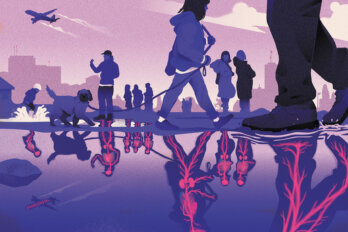THE NIGHT BEFORE a convoy of protesters was expected in Ottawa this past January, I saw what appeared to be two dump trucks parked defensively in front of an entrance to the prime minister’s residence. The strategic configuration of heavy machinery on city streets is a well-known antiterrorism tactic used around the world, and for me it signified a tipping point about how serious things had become. Is this really where Canada is at in 2022?
For all the responses offered by public figures and media outlets, no one really seemed to know what to make of the events in Ottawa and elsewhere over those three weeks in January and February. What started as an opposition to a vaccination policy that would affect the minority of truckers who cross the Canada-US border became a referendum on, among other things, whether this is the kind of country that can support a prominent white supremacy movement. Was the “Freedom Convoy” an isolated expression of fatigue and economic frustration in the midst of a long winter—or a sign of larger systematic failure?
In other words, if the protests underscored prevailing fears that the centre would not hold, it wasn’t just because they disrupted thousands of people’s lives by blocking streets and forcing the Rideau Centre mall to close. Two years into the COVID-19 pandemic, we are all increasingly attuned to the surprising instability of our essential systems. In good times, most of us enjoy the privilege of not having to question whether hospitals can take care of people, schools can function, or businesses can stay open. Now, with each new disruption to the status quo, you wonder how far things can be pushed.
A wide range of stories in this issue explore the status of various systems in the face of rapid change and particular challenges. Among them is child care, a leading factor in the “she-cession” and something that governments have been promising Canadians for decades. In our cover story, “Child Care for All,” Sadiya Ansari, based in Berlin, uses Germany’s twenty-year experience with universal daycare as a guide to Canada’s proposed $10-a-day child care policy and anticipates the support we’ll need to ensure its success.
If you’ve ever been asked to sign an organ donor card, you probably know that national participation in the program is low. (Only 32 percent of Canadians have registered their decisions about whether to donate.) But what most of us don’t know is that, like so many elements of our overlapping health care infrastructure, the current system for organ transplants is itself quite fragile, and the majority of donated organs are never transplanted due to logistical problems. In “How to Boost Organ Donation Without More Donors,” Karin Olafson traces the innovations the medical community is testing to save more lives.
Rawi Hage is a novelist based in Montreal. The internationally acclaimed writer has commented on global politics and current affairs while pushing creative boundaries in works like De Niro’s Game and Beirut Hellfire Society. In “The Wave,” a short story from his new collection, Stray Dogs, Hage’s narrator explores the limits of community and culture in the face of natural and human disasters. You can also hear Hage’s thoughts about his latest work and the state of the world in an episode of The Deep Dive, a new podcast from The Walrus.
Not every challenge we face right now is caused by the pandemic, but the stress it has added to existing systems like health care, the economy, and our social safety net has arguably made almost everything else less resilient, including our patience. Listening to the convoy protesters’ repeated calls for “freedom,” it struck me that what many of them really seemed to want was an escape from the all-encompassing weight of illness, uncertainty, and disruption—a chance to go back in time to a world where COVID-19 doesn’t exist. Don’t we all? Even with the return to stability in the nation’s capital, it’s clear we still have challenges to face. If the problems of the past few years have done anything, it’s demonstrate how interdependent we all are. To work, any solutions will need to recognize that.





